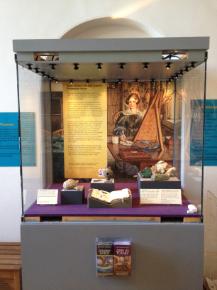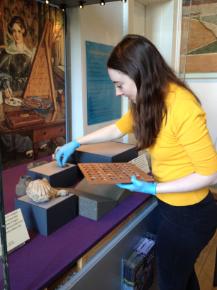Alligator eggs and hyena bones
Posted on 4 May 2018
CECS MA student, Rachel Campbell, has completed a placement at the Yorkshire Museum on 'Hidden Women in the early Yorkshire Philosophical Society'
The Yorkshire Philosophical Society was set up in 1822. Its main aim was to help improve the members’ understanding of the natural sciences, as as geology and archaeology.
Women were not allowed to be members when the society was set up in 1822 (they were eventually given membership in 1850), but as Annual Subscribers they had access to the Museum and the Museum Gardens. The main way women could take part was by donating money and various items to the museum, such as fossils and minerals. They were part of a group of wealthy families who were important to the society, providing them with useful social and economic networks.
Among the early donors was the Norcliffe/Best family. Anne Norcliffe, of Langton Wold, was the first woman to be mentioned on the list of donors. In 1824 she gave the museum items similar to the ones displayed here. Her daughter Mary Norcliffe Best donated Roman artefacts, and various types of insects. Mary Ellen Best, the artist, was her daughter and regularly visited the Gardens and Museum, meeting other members of the Society and enlarging her circle of acquaintances and potential patrons. This self-portrait “The Artist at Work” shows Mary Ellen at her easel.
- Susan Thorpe was married to Anthony Thorpe, who was one of the men who set up the Society in 1822. In 1831 Susan Thorpe donated bones from animals found in Kirkdale Cave, a key event in the establishment of the society. The bones displayed here are the type donated by Susan Thorpe.
(Background Research: Rachel Campbell, MA Eighteenth Century Studies 2017-2018, University of York
Mentors: Professor Jon Mee, CECS & Dep of English and Related Literature & Judith Glover, Vice Chair of the YPS)
The Public History Placement is an option module offered as part of the MA in Eighteenth Century Studies and provides students with the opportunity to experience developing a public history project in practice, and to reflect critically upon that practice. The Yorkshire Museum is among many sites in York's cultural precinct and sits beside the Centre for Eighteenth Century Studies, based in the historic King's Manor.


